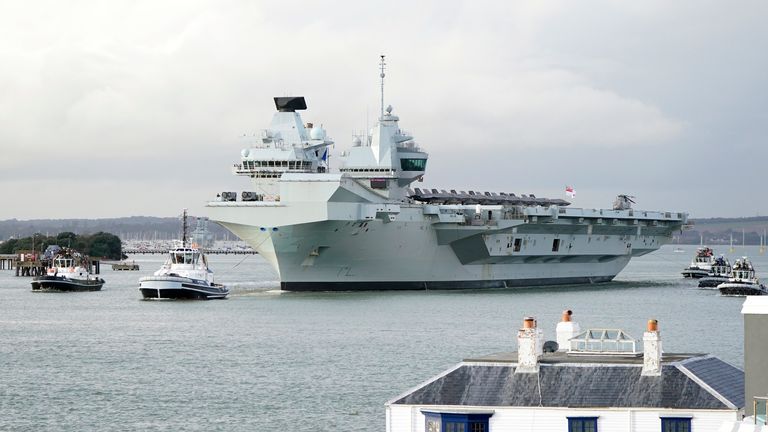The UK armed forces are losing personnel faster than they can recruit, leaving their “warfighting readiness” in doubt, according to a new report by the Defence Committee.
The report also found the military has “key capability and stockpile shortages” that would hamper its ability to engage in “all-out, prolonged war”.
It comes as the Royal Navy announced that its most powerful warship, HMS Queen Elizabeth, would not be sailing from Portsmouth on Sunday as planned to head more than 40 vessels taking part in the largest NATO exercise in Europe since the Cold War because of a mechanical issue.
The fleet commander said: “Routine pre-sailing checks yesterday identified an issue with a coupling on HMS Queen Elizabeth’s starboard propeller shaft.
“As such, the ship will not sail on Sunday. HMS Prince of Wales will take the place of HMS Queen Elizabeth on NATO duties and will set sail for Exercise Steadfast Defender as soon as possible.”
The Steadfast Defender drills will take place off Norway’s Arctic coast in March.
The deployment comes after armed forces minister James Heappey suggested that a British aircraft carrier could be sent to the Red Sea amid the continuing threat by Iran-backed Houthi rebels.
The Defence Committee report comes amid intensifying debate about whether we are on the cusp of another world war – and whether Britain would be ready to fight.
Admiral Rob Bauer, chairman of the NATO military committee, has said its forces are preparing for war with Russia, while Defence Secretary Grant Shapps warned we are living in a “pre-war world“.
These comments have driven conversation about whether we could see a return to conscription.
The Defence Committee said it was “increasingly concerned” about what it called a “crisis” in recruitment and retention.
Read more from Sky News:
Grant Shapps rejects claims the army will shrink further
Is conscription coming back?
The Ministry of Defence (MoD) has publicly conceded just five people are recruited to the armed forces for every eight who leave – but the committee said it understood the situation may now be even worse.
The military is “consistently overstretched”, it said, which has a personal cost for staff and impacts retention.
“A steady, continuous drip of operations and ongoing commitments has meant the military is unable to devote sufficient training and resources to high-intensity warfighting,” chair of the committee, Sir Jeremy Quin, said.
“While able to deploy at short notice and to fulfil commitments, our inquiry found that readiness for all-out, prolonged war has received insufficient attention and needs intense ongoing focus.”
Readiness is defined as how long it takes to go from an initial order to a unit being ready to perform its task, and is considered an important part of deterrence.
Professor Sir Lawrence Freedman, emeritus professor of war studies at King’s College London, told the inquiry that if the UK had to fight a “come-as-you-are war”, the armed forces would “have difficulty” given their current levels of equipment and stockpiles.
Sir Jeremy said it was time for the government to make “difficult choices”.
“Either invest fully in our military or recognise that proper prioritisation of warfighting will mean less availability for other tasks,” he said.
“We need to be strategic about the resources we have, including how to maintain and replenish stockpiles, and consider how to ensure that equipment – even after retirement – does not go to waste.”
And speaking to Sky News, Sir Jeremy said the question posed by the report is whether the UK is “doing the training, maintaining the retention of our skilled personnel and do we have the stocks and future replenishment that we would need in the worst kind of conventional conflict” alongside its current commitments.
Sir Jeremy said: “That’s a peer-on-peer, high intensity, prolonged warfare in Europe.
“There are real questions that need to be addressed.”
The Defence Committee, which is appointed by the House of Commons to examine the MoD, also took aim at an “unacceptable… lack of government transparency” during its inquiry.
“Key information that was readily available a decade ago is no longer published for reasons that are unclear, and the government has taken excessive time to respond to our requests for information,” it said.
Speaking to Sunday Morning With Trevor Phillips, Education Secretary Gillian Keegan said more than £50bn was being spent on defence to “ensure we have the operational capabilities” for things like NATO missions, support for Ukraine or missions in the Red Sea.
She added: “Our armed forces are ready to be there to conduct whatever it is that is required.
“And they’ve shown time and time again, you know, how well they do that and what a vital part of global order they play.”
Click to subscribe to the Sky News Daily wherever you get your podcasts
A spokesperson for the Ministry of Defence said: “Our armed forces are always ready to protect and defend the UK, and we continue to meet all operational commitments, including participating in every single NATO mission, supporting Ukraine, and tackling Houthi attacks on shipping in the Red Sea.
“We are spending more than £50 billion on defence this year alone, and have significantly increased our spending on defence equipment to £288.6 billion over the next decade, including investing in deepening our stockpiles and bringing in new tanks, fighter jets and warships.
“We have been clear that increasing recruitment and improving retention across the services is a top priority, including through ensuring improved career opportunities and making it easier for people to re-join the forces, on top of the largest pay increase in more than 20 years.”
On HMS Queen Elizabeth, fleet commander Vice Admiral Andrew Burns said: “Routine pre-sailing checks yesterday identified an issue with a coupling on HMS Queen Elizabeth’s starboard propeller shaft. As such, the ship will not sail on Sunday.
“HMS Prince of Wales will take her place on NATO duties and will set sail for exercise steadfast defender as soon as possible.”



